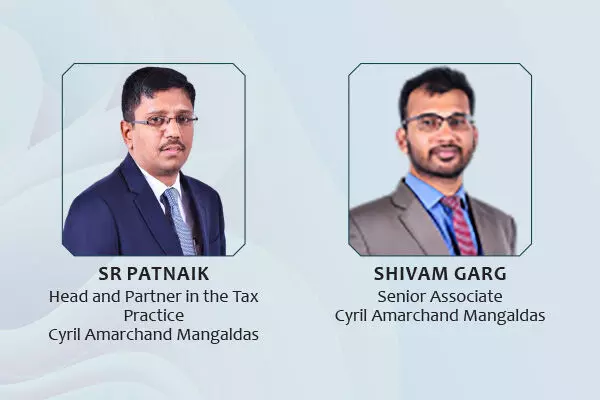- Home
- News
- Articles+
- Aerospace
- Artificial Intelligence
- Agriculture
- Alternate Dispute Resolution
- Arbitration & Mediation
- Banking and Finance
- Bankruptcy
- Book Review
- Bribery & Corruption
- Commercial Litigation
- Competition Law
- Conference Reports
- Consumer Products
- Contract
- Corporate Governance
- Corporate Law
- Covid-19
- Cryptocurrency
- Cybersecurity
- Data Protection
- Defence
- Digital Economy
- E-commerce
- Employment Law
- Energy and Natural Resources
- Entertainment and Sports Law
- Environmental Law
- Environmental, Social, and Governance
- Foreign Direct Investment
- Food and Beverage
- Gaming
- Health Care
- IBC Diaries
- In Focus
- Inclusion & Diversity
- Insurance Law
- Intellectual Property
- International Law
- IP & Tech Era
- Know the Law
- Labour Laws
- Law & Policy and Regulation
- Litigation
- Litigation Funding
- Manufacturing
- Mergers & Acquisitions
- NFTs
- Privacy
- Private Equity
- Project Finance
- Real Estate
- Risk and Compliance
- Student Corner
- Take On Board
- Tax
- Technology Media and Telecom
- Tributes
- Viewpoint
- Zoom In
- Law Firms
- In-House
- Rankings
- E-Magazine
- Legal Era TV
- Events
- Middle East
- Africa
- News
- Articles
- Aerospace
- Artificial Intelligence
- Agriculture
- Alternate Dispute Resolution
- Arbitration & Mediation
- Banking and Finance
- Bankruptcy
- Book Review
- Bribery & Corruption
- Commercial Litigation
- Competition Law
- Conference Reports
- Consumer Products
- Contract
- Corporate Governance
- Corporate Law
- Covid-19
- Cryptocurrency
- Cybersecurity
- Data Protection
- Defence
- Digital Economy
- E-commerce
- Employment Law
- Energy and Natural Resources
- Entertainment and Sports Law
- Environmental Law
- Environmental, Social, and Governance
- Foreign Direct Investment
- Food and Beverage
- Gaming
- Health Care
- IBC Diaries
- In Focus
- Inclusion & Diversity
- Insurance Law
- Intellectual Property
- International Law
- IP & Tech Era
- Know the Law
- Labour Laws
- Law & Policy and Regulation
- Litigation
- Litigation Funding
- Manufacturing
- Mergers & Acquisitions
- NFTs
- Privacy
- Private Equity
- Project Finance
- Real Estate
- Risk and Compliance
- Student Corner
- Take On Board
- Tax
- Technology Media and Telecom
- Tributes
- Viewpoint
- Zoom In
- Law Firms
- In-House
- Rankings
- E-Magazine
- Legal Era TV
- Events
- Middle East
- Africa

Metamorphosis of GST framework pertaining to Online Gaming
Metamorphosis of GST framework pertaining to Online Gaming

Metamorphosis of GST framework pertaining to Online Gaming While the GST authorities may contend that the new legislation is very easy, simple and straight forward and is aimed at reducing the controversies surrounding online games, they have taken the most conservative approach and have tried to put all games of skill or chance, into one category and expect the same to be subject to GST at...
To Read the Full Story, Subscribe to Legal Era News
Access Exclusive Legal Era Stories, Editorial Insights, and Expert Opinion.
Already a subscriber? Sign in Now
Metamorphosis of GST framework pertaining to Online Gaming
While the GST authorities may contend that the new legislation is very easy, simple and straight forward and is aimed at reducing the controversies surrounding online games, they have taken the most conservative approach and have tried to put all games of skill or chance, into one category and expect the same to be subject to GST at the highest possible rate of 28%.
The online gaming sector is a sunrise sector in India. While certain upbeat regulatory as well as tax changes have been made in the preceding months to give impetus to the sector, the levy of the Goods and Services Tax (“GST”) on online games had been ambiguous.

Online games played in India typically work on revenue models such as rake fee model, where the gaming platform charges a fee for facilitating the game or the freemium model wherein the game is free but activities such as additional or prolonging the game-time by giving additional opportunities, improving health/performance, skipping levels, asking the player to view certain advertisements compulsorily, etc. can be provided to a player either for monetary consideration or for some other benefits.
Situation till now
The entire conundrum orbits around the GST legislation’s irregular tax classification and its treatment of games of skill vis-à-vis games of chance. There were also concerns regarding the valuation in the absence of defined valuation rules and the confusion about the levy of GST on the entire value in connection with the rake charge. The industry had been charging an 18% GST on the platform fee i.e. gross gaming revenue (“GGR”) till recently. However, the GST authorities did not agree with this classification and treatment, which was prevalent across online gaming industry. As per the GST authorities, the complete amount received by the online gaming platform including the amount deposited in the winning pool, ought to have been considered as the value of supply. They were also unhappy with the rate paid by the online gaming industry because according to them, the applicable rate ought to have been28%, which is at par with the rate applicable to activities such as betting and gambling, and not at the prevailing rate of 18%.
Being unhappy with the position taken by the industry, the GST authorities had also issued a notice to gaming platform Games kraft for around INR 21 billion. While the progressive decision of the Hon’ble Karnataka High Court negated the demand of tax authorities to charge 28% GST on skill games1 and held that whether the game was played online or physically, with or without stakes is not the determining factor. The test of predominance i.e. the outcome of game is determined by skill of the player or chance determines the same is the only criteria. According, it held that rummy is a game of skill and quashed the notice. Being aggrieved by the decision of the Hon’ble Karnataka High Court, the GST authorities had approached the Hon’ble Supreme Court of India. The Hon’ble Supreme Court of India has recently stayed the aforesaid decision of the Hon’ble High Court.
From the information available in the public domain, we understand that several other gaming platforms have also received notices asking them to pay additional GST for the past. With the ongoing stay granted by the Hon’ble Supreme Court and the additional notices being issued to the online gaming companies, there was a huge amount of uncertainty and hence, efforts were made by the association of such gaming companies to engage with the Government and request them to issue clarifications / amendments and put this uncertainty to rest. It was also submitted by them that this is a sunrise industry and too much of uncertainty may harm their grow as investors would get spooked.
Amendment in GST legislations
In order to address the corresponding disputes and uncertainties, GST Council had set up a committee of group of ministers (“GoM”) which provided its recommendations on the said issue. Accordingly, it was recommended that online gaming would be taxed at the higher rate of 28% on the face value of the bets.
The entire conundrum orbits around the GST legislation’s irregular tax classification and its treatment of games of skill vis-à-vis games of chance for the past period.
Basis the recommendation of GST Council, the Government has amended the GST legislations. The new provision creates a specific sub-classification of online games as online money games (“OMG”), where players pay or deposit money in the expectation of winning money from online games. The definition clearly provides that OMG includes, inter alia, all games of skill, chance or both which are either permissible or not under any other law. It appears that through this amendment, it is being proposed to avoid any distinction between gaming and gambling, that had been established over more than last sixdecades of jurisprudence. While the GST authorities may contend that the new legislation is very easy, simple and straight forward andis aimed at reducing the controversies surrounding online games, they have taken the most conservative approach and have tried to put all games of skill or chance, into one category and expects the same to be subject to GST at the highest possible rate of 28%.While the earlier ambiguities had resulted in problematic and subjective fact-finding exercises from the GST authorities, the new amendment seems to have turned the table upside down by asking all such online gaming entities to classify all such games as OMG and directed them to pay the maximum possible rate of 28%.
While actionable claims other than betting, lottery and gambling were excluded from purview of GST, the same has now been amended to include actionable claims pertaining to OMG. The amendments have also been made to prevent unscrupulous business models to avoid GST. OMG suppliers located outside India are required to obtain a simplified GST registration and deposit GST in India. In case of failure to comply, access by the public may get blocked. There are elaborate provisions dealing with valuation of OMG at full value as well.
Way Ahead
The aforesaid changes have been made effective by Centre from October 01, 2023, however, as per information available, several States have not amended their respective State GST legislations as yet and hence, delaying its implementation. While the changes brought forward clarify the imposition of GST by eliminating uncertainties and ambiguities, since there are no distinctions about whether a game is a game of skill or chance. It is evident that the objective of the Government is to augment the collection of taxes from an exponentially growing sector, however, it remains to be seen whether the investor interest remains the same in the coming few days.
A simple and uncomplicated tax regime would have provided a fertile business environment in a newly popular industry. However, the recent amendments may also have a contra effect.
Disclaimer – The views expressed in this article are the personal views of the authors and are purely informative in nature.


